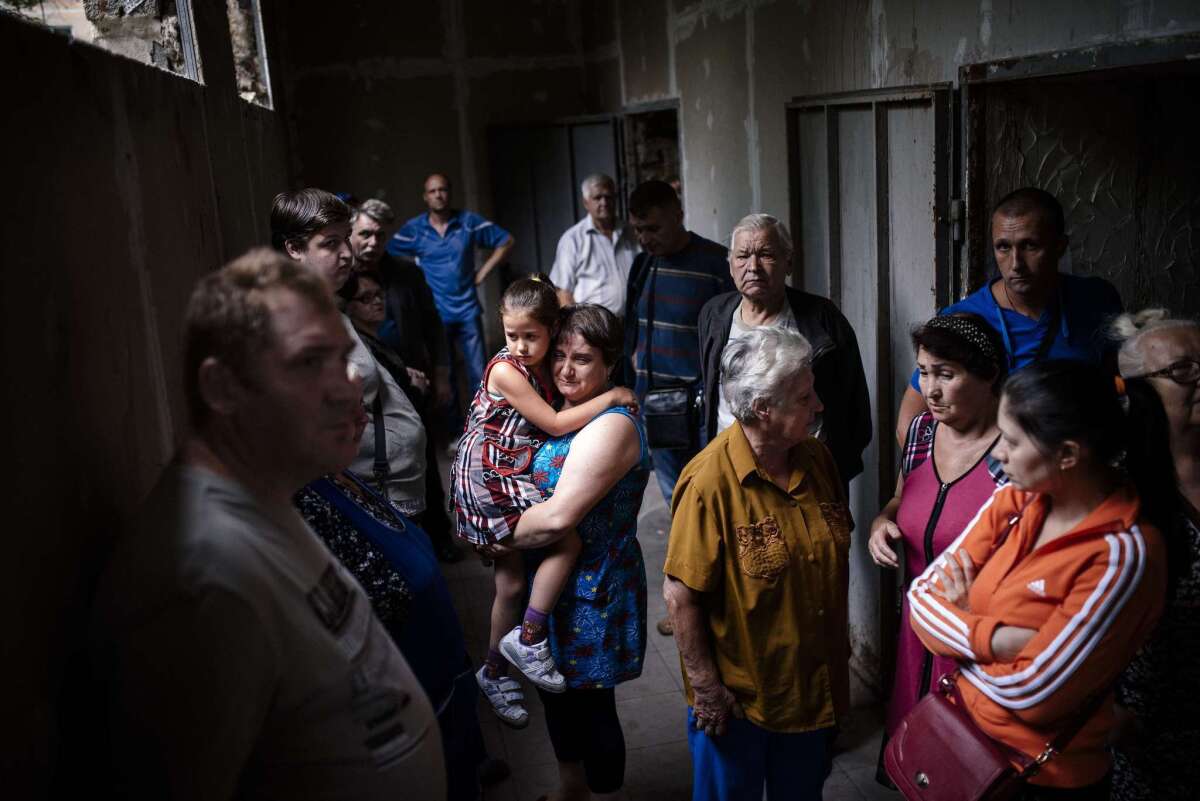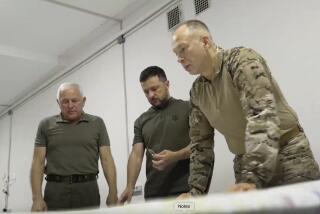Presidents of Russia, Ukraine to meet in Belarus as fighting rages

- Share via
Reporting from Moscow — The presidents of Russia and Ukraine will meet next week in Minsk, the capital of neighboring Belarus, to discuss the combat consuming eastern Ukraine and Kiev’s diplomatic turn toward the European Union that sparked the conflict.
Russian President Vladimir Putin’s office announced the Aug. 26 summit that will include the three former Soviet states comprising the Kremlin-led Eurasian Customs Union -- Russia, Belarus and Kazakhstan -- as well as Ukrainian President Petro Poroshenko and three top officials of the European Union.
The talks between Putin and Poroshenko are the first since the Ukrainian candy magnate’s June 7 inauguration that restored elected leadership to Kiev after seven months of political unrest. They held a short discussion on the fringes of the 70th anniversary of the Allied D-Day landing in Normandy on June 6.
“Naturally, we cannot ignore the catastrophic situation in Ukraine’s eastern regions, especially Donetsk and Luhansk,” Kremlin spokesman Dmitry Peskov told Itar-Tass on Tuesday. “We can assume that it is going to be part of the agenda.”
Poroshenko’s office said the meeting was arranged to discuss “issues related to the implementation of the association agreement between Ukraine and the EU, energy security and the stabilizing of the situation in the Donbas,” the conflict area in eastern Ukraine’s Don River basin.
Former Ukrainian President Viktor Yanukovich provoked a rebellion among European-leaning Ukrainians in November when he rejected a European Union association agreement that the nation and the alliance had been negotiating for three years.
Yanukovich was overthrown during the late February culmination of the revolt, and the appointment of an interim leadership of his political opponents spurred Putin to deploy troops to Ukraine’s Crimea region to secure the strategic peninsula where Russia’s Black Sea Fleet is based. Russia annexed the seized territory on March 18, inspiring pro-Russia separatists in other areas of eastern Ukraine to rebel against rule from Kiev.
Putin has been accused by the Ukrainian leadership and its Western allies of fomenting the insurgency and sending in arms and mercenaries. The Kremlin denies it has backed the militants, although many of its leaders have been Russian citizens, including special forces officers commanding fighters.
On Tuesday, a Ukrainian security spokesman said government forces had retaken control of more territory in Luhansk, the besieged eastern city that is one of two remaining strongholds of the separatists. The city is reportedly surrounded by troops.
Col. Andriy Lysenko of the Ukrainian Security and Defense Council told journalists in Kiev, the capital, that one part of central Luhansk had been “liberated,” although fighting continued in other areas of the city where more than 200,000 civilians remain.
He said troops had recovered the bodies of 17 civilians killed Monday when rocket fire hit an evacuation convoy headed for Russia to escape the escalating dangers. The recovery operation had to be suspended before all of the victims’ remains were retrieved, Lysenko said. He repeated the Kiev government’s accusation that separatists fired the rockets that incinerated the line of cars and buses carrying the civilians to safety.
Living conditions in central Luhansk, a city of 465,000 before the conflict, are reportedly dire. Many of the shabby concrete apartment blocks have been hit by artillery fire over the last five months.
A Russian convoy that left Moscow eight days ago carrying aid to trapped civilians in Luhansk remained parked near the Russia-Ukraine border awaiting security assurances from the Kiev government and the insurgents before escorts from the International Committee of the Red Cross would proceed with delivery, Russian media reported.
A Red Cross spokeswoman in Geneva said the aid agency was still waiting for security guarantees from both sides, although Russia’s state-run RIA Novosti news agency reported that the self-proclaimed People’s Republic of Donetsk had provided those assurances.
The separatist-declared state isn’t recognized outside of the insurgent circles, and third parties such as the Red Cross usually look to the militants’ allies in Moscow to secure their cooperation.
Russian Foreign Minister Sergei Lavrov reiterated the separatists’ pledge to facilitate the aid delivery and told reporters in Moscow that he hoped the Kiev government wasn’t deliberately delaying their security assurances to disrupt the Russian effort.
Putin last week announced he was unilaterally sending the 280-truck convoy, stirring fears in Kiev that the huge deployment was cover for plans to invade eastern Ukraine, as happened in Crimea six months ago.
Poroshenko’s government insisted the vehicles’ cargo be inspected before it crossed into Ukrainian territory, and that the convoy enter through a government-controlled border crossing. The trucks instead headed to Kamensk-Shakhtinsky, a town in Russia’s Rostov region about 20 miles from the Ukrainian border with the separatist-held Luhansk region.
Ukrainian troops have since recaptured the town of Novosvitlivsk, between Luhansk and the Russian border, undermining what appears to have been a Kremlin plan to push into Ukrainian territory with the relief supplies without Kiev’s authorization.
The convoy is said to be carrying 2,000 tons of supplies, including bottled water, cereals, baby food, sleeping bags and generators.
Areas of Luhansk have been without water, electricity and communications for more than two weeks, and separatist leaders in the city have warned of a sanitation crisis as garbage piles up uncollected and water and sewer lines have been damaged by shelling.
Special correspondent Gorst reported from Moscow and Times staff writer Williams from Los Angeles.
Follow @cjwilliamslat on Twitter for the latest international news 24/7.
More to Read
Sign up for Essential California
The most important California stories and recommendations in your inbox every morning.
You may occasionally receive promotional content from the Los Angeles Times.











